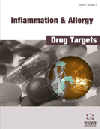
Design and Modifications of Allergens for Improving Specific Immunotherapy
Specific immunotherapy is a clinically effective causative treatment for allergic conditions. However, the reagents used for immunotherapy are crude extracts, prepared from natural sources, and as such may cause potential lifethreatening anaphylactic side effects. Our increasing knowledge of mechanisms that lead to allergy and of the mechanisms of successful immunotherapy have introduced new ideas for the treatment of allergic diseases.
Techniques of biochemistry and molecular biology have made it feasible to design novel therapeutic approaches for improved and safer forms of allergen-specific immunotherapy. The purpose of this review is to examine different approaches in designing novel allergen formulations for specific immunotherapy. These include chemically modified forms of allergens, genetically modified allergens (hypoallergens), hybrid allergens and allergens bearing immunostimulatory molecules, or adjuvants, which foster Th 1 immune responses.
There is great interest in newly designed allergens and their derivatives to improve the efficacy and safety of allergen immunotherapy. A better understanding of immunological mechanisms and further clinical trials utilizing new allergen formulations are needed.
Techniques of biochemistry and molecular biology have made it feasible to design novel therapeutic approaches for improved and safer forms of allergen-specific immunotherapy. The purpose of this review is to examine different approaches in designing novel allergen formulations for specific immunotherapy. These include chemically modified forms of allergens, genetically modified allergens (hypoallergens), hybrid allergens and allergens bearing immunostimulatory molecules, or adjuvants, which foster Th 1 immune responses.
There is great interest in newly designed allergens and their derivatives to improve the efficacy and safety of allergen immunotherapy. A better understanding of immunological mechanisms and further clinical trials utilizing new allergen formulations are needed.
Keywords: Immunotherapy; allergen; allergoid; hypoallergen; modification
Document Type: Research Article
Publication date: 01 December 2008
- Inflammation & Allergy - Drug Targets aims to cover all the latest and outstanding developments on the medicinal chemistry, pharmacology, molecular biology, genomics and biochemistry of contemporary molecular targets involved in inflammation and allergy e.g. disease specific proteins, receptors, enzymes, genes. Each issue of the journal contains a series of timely in-depth reviews written by leaders in the field covering a range of current topics on drug targets involved in inflammation and allergy. As the discovery, identification, characterization and validation of novel human drug targets for anti-inflammation and allergy drug discovery continues to grow, this journal has become essential reading for all pharmaceutical scientists involved in drug discovery and development.
- Editorial Board
- Information for Authors
- Subscribe to this Title
- Ingenta Connect is not responsible for the content or availability of external websites
- Access Key
- Free content
- Partial Free content
- New content
- Open access content
- Partial Open access content
- Subscribed content
- Partial Subscribed content
- Free trial content